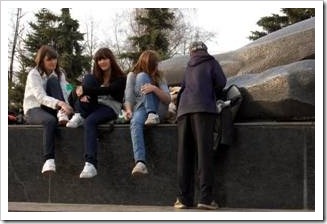Being a teenager is not easy. Being a parent of teenagers is not easy either, but there are ways for parents to help make life easier for both. Here is a list of 5 more thoughts that teens have, which your behavior and attitude as a parent can change to make the teen years much nicer.
I must be adopted
“Maybe I was adopted. That explains the way they treat me. I’ve heard them saying I looked like Mom, but I look at my photos as a baby and I don’t look like either one of my parents or even like myself today. They could have adopted me when I was just a baby. That makes sense. I think this is why they love my brother more than they love me.”
What parents can do

Talk to your kids about their birth and talk about it a lot. Kids ask question about their pregnancy and birth to check if all the stories match. If Mom tells one story and Dad tells another one about the same birth, that will be odd, but if they tell the stories over and over and everything matches, they must be true!
Teenagers ask other family members about their birth to find out if someone has a different version of the story. As they grow up, they become more sophisticated with their questions and look for more contradictions. If Grandma says you were overseas just before the birth, it will make them question it. If you show them their photos of you (your partner) pregnant, their birth certificate and photos of you holding them in your arms as a newborn baby, that will help them accept that they are truly your child and not adopted.
Video is an exceptional way to prove your biological connection, because it combines the audio of using their name with the pictures of people they know and emotions that can help them feel loved and get past their doubts.
It’s all on me now
“When we play cards, I beat Mom easily. I think I’m much better than she is at this game. I know more tricks than she does. Parents should know more than their kids do. If not, how can she take care of me? I need to take care of myself from now on.”
What parents can do

To avoid this situation, ask for your kids’ help and say, “You are better than me with this. Can you please help me do it?” When you talk about skills, talk about you and your partner as having different skills to show your kids that becoming a parent does not make you skilled at everything. Say, “Mom is much better than me at remembering things like that” or “Dad is very good at cooking this dish”.
When your teen expects you to do something you cannot do, you can address their feeling directly, show empathy and help them relax and find another solution.
I’m growing old
“I looked at my mom this morning and saw she was not as pretty as she was when she was young. What will happen to me when I grow old? I don’t want to lose my hair like Dad or become fat and wrinkled. How can I stop growing old?”
What parents can do

Do not defend the old style by talking badly about the new generation. It is a sign you are not accepting change and it will make it harder for you to teach your kids to accept change. I remember my dad saying that the music we listened to was loud and screaming and that there was no value in it, but I listened to Julio Iglesias and Barbara Streisand singing with the Bee Gees and they sang soft songs about love.
Talk to your kids about fashion and about different generations. Talk to them about growing up, growing old and growing wiser to help them appreciate the inside and not only the outside.
Take a photo of them every year from birth to show them that they have changed too and that the fashion was different when they were kids.
I run workshops for student leaders at schools and senior citizens and both “sides” find the experience heartwarming and enriching. Encourage your teens to spend time with old people (grandparents are best) and take an interest in their story.
Fear of being old is a very legitimate fear and everyone has some versions of it. Kids experience the thought and your attitude will determine if this thought will stay or disappear.
I wish I could change the past
“I regret so many things. I wish I could back in time and change some things. Maybe my life wouldn’t be so hard if we had lots of money or Mom wasn’t sick or Dad didn’t work so many hours.”
What parents can do

If your teen shows lots of regrets and a desire to change the past, it is a sign they have an unfinished business that needs to be sorted. Kids take lots of blame on themselves when there is a family problem. This is why divorce always triggers in kids the thoughts “What have I done to make them divorce?” and “What can I do to bring them back together?” Even adults whose parents are divorced still often think that way.
Kids that live it the time machine dream have not learned from their parents to let go. This is often because their parents do not know how to let go themselves. They blame others for their problems, they have lots of guilt feelings and regrets and they use the guilt trip on others as a way to ease their own burden.
It is very important to understand that we cannot turn back time. That is life. A second that passes cannot be repeated and kids can learn this from a very early stage. Even a 6-year-old can learn that once things are done, they cannot be undone and we can only do things differently next time.
Teach your kids to focus on what they can change and let go of things they cannot change. There is no point regretting not talking your umbrella today, because you are not a fortuneteller. At every point in time, we make decisions based on the information we have and on who we are and we pick the option that seems most appropriate at that moment. Yes, we may find it was not the best option later on, but we cannot turn the clock backward to change our previous decisions. The clock only moves forward and our feelings about it do not really change its ticking.
I hate housekeeping
“I hate cleaning my room. I wish someone else did it for me. I wish I had a robot doing everything I asked it.”
What parents can do

I hated cleaning too and I think it is strongly connected to the way my mom treated cleaning in our house. We were five kids, so we obviously had to take turns, but she was so fussy about doing things in what she considered “the right way” that we hated these jobs. After washing the floor, she would point out the places that were not spotless. While washing the dishes, she would stand over our shoulder and say, “You need to wash this first”, instead of focusing on doing what we can to keep our dishes clean for the sake of our health.
The reason I say it was my mom’s fault was that at the age of 14, my younger sisters and I had a good discussion about this, in which we realized we all hated doing chores by ourselves and decided to do them together. So instead of each of us doing something different, we washed the dishes together, washed the floor together and cleaned each room together. After a short time, cleaning became great fun. We did not complain and we did not mind how long it took, because we loved being together. During that time, our house was very clean and tidy and my mom did not control us anymore. We had full control over how to do things. She could tell us what needed to be done, but she could not tell us who should do what or how to do things and we loved every second of it. Even now, cleaning the house on my own is not fun at all, but cleaning with Gal and/or the kids is much more fun.
Housework is part of life, not a form of punishment. Do not give rewards for cleaning or punishments for not cleaning (“You are grounded” or “You can go to the party only when your room is clean”). Try doing things together. From time to time, clean their room and instead of asking them to “pay” for it, think of it as an opportunity to be a role model.
Also, avoid asking them to do things on their own and involve them in scheduling their own chores.
Join me next week for 5 more thoughts teenagers have and explanations of how each thought is formed and what you can do to help your teenagers change it.
Happy parenting,
Ronit
This post is part of the series Troubled Teens:
- Troubled Teens: Confusing Years
- Troubled Teens: Disturbing Thoughts
- Troubled Teens: Scary Times
- Troubled Teens: Terrible Times
No posts found








